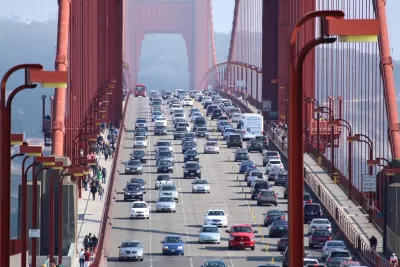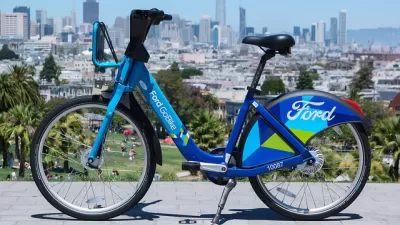The city is seeing more transit use and biking, but driving and congestion are also on the rise.

The San Francisco Municipal Transportation Agency recently released its latest assessment of transportation trends in the city, the San Francisco Mobility Trends Report 2018. "Compiled by SFMTA staff, the report assesses which methods of transit SF residents are most likely to use, employing everything from traffic counts to official ridership stats from transit agencies to Census data about bike use," reports Adam Brinklow.
While the report says that transit use and cycling has increased since 2010, particular time frames tell different stories. For example, transit ridership is still down from a peak in 2002, and biking has decreased in recent years, with a more than 24 percent drop since 2015.
In addition, the growth in San Francisco's population has resulted in a 6 percent increase in registered vehicles since 2010 as well as more congestion. The report says that half of the congestion from 2010 to 2016 can be attributed to ride hailing and the other half to population and employment changes.
The increase in transit use in San Francisco distinguishes it from most other U.S. cities where transit ridership is in decline. "However, it’s still clear from the analysis that City Hall has trouble breaking San Franciscans from their reliance on cars. Silicon Valley is only exacerbating the situation," notes Brinklow.
FULL STORY: Despite everything, San Franciscans are driving more

Planetizen Federal Action Tracker
A weekly monitor of how Trump’s orders and actions are impacting planners and planning in America.

Restaurant Patios Were a Pandemic Win — Why Were They so Hard to Keep?
Social distancing requirements and changes in travel patterns prompted cities to pilot new uses for street and sidewalk space. Then it got complicated.

Map: Where Senate Republicans Want to Sell Your Public Lands
For public land advocates, the Senate Republicans’ proposal to sell millions of acres of public land in the West is “the biggest fight of their careers.”

Maui's Vacation Rental Debate Turns Ugly
Verbal attacks, misinformation campaigns and fistfights plague a high-stakes debate to convert thousands of vacation rentals into long-term housing.

San Francisco Suspends Traffic Calming Amidst Record Deaths
Citing “a challenging fiscal landscape,” the city will cease the program on the heels of 42 traffic deaths, including 24 pedestrians.

California Homeless Arrests, Citations Spike After Ruling
An investigation reveals that anti-homeless actions increased up to 500% after Grants Pass v. Johnson — even in cities claiming no policy change.
Urban Design for Planners 1: Software Tools
This six-course series explores essential urban design concepts using open source software and equips planners with the tools they need to participate fully in the urban design process.
Planning for Universal Design
Learn the tools for implementing Universal Design in planning regulations.
Heyer Gruel & Associates PA
JM Goldson LLC
Custer County Colorado
City of Camden Redevelopment Agency
City of Astoria
Transportation Research & Education Center (TREC) at Portland State University
Camden Redevelopment Agency
City of Claremont
Municipality of Princeton (NJ)





























